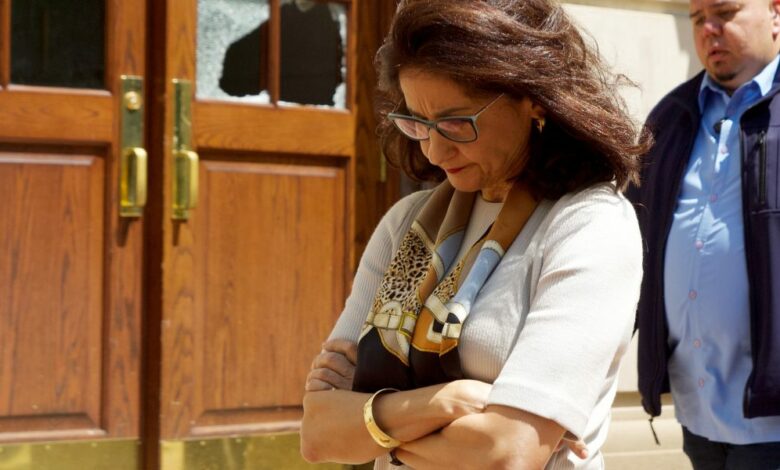Columbia created new rules after historic 1968 protests. Its administration just broke them to authorize police on campus, university report concludes


Columbia University’s South Lawn, where students built two “Gaza Solidarity Encampments,” is now empty, after police equipped with military-grade weapons and riot gear carried out the largest mass arrests of students on the campus since the school’s infamous 1968 protests.
More than 200 students were arrested during two police raids on April 18 and April 30, the latter of which, coincidentally, is the same day 700 students were arrested for protesting the divisive Vietnam War and Columbia’s expansion into Harlem more than 50 years ago.
Following the protests, in 1969 Columbia restructured the way its administration makes judgements that affect students through the creation of regulatory bodies bound by policies of shared governance at the school. It created the University Senate—a board of roughly 100 faculty, students, administrators, and alumni—meant to be a “policy-making body which may consider all matters of university-wide concern,” according to the school’s website.
Prior to April 18, the University Senate voted unanimously to veto a decision by the administration to bring police onto campus where students were demonstrating.
In allowing the police to enter Columbia grounds anyways, the university administration contradicted policies the school itself had agreed to, according to a senate report Fortune reviewed.
That decision “undermined shared governance, rather than adhere to the rules of university conduct adopted by our university senate and set out in the university statutes,” states an op-ed written by the Columbia College Student Council published by The Guardian. The separate University Senate report reviewed by Fortune found that bringing the cops onto campus violated the very framework of consultation that was established in response to the prolific student protests of 1968.
Roosevelt Montas, who has been teaching at Columbia for 30 years and has held roles on the University Senate in the past, told Fortune that to the best of his knowledge, the rules of consultation established in 1969 have never been broken before—until now.
The most significant action in violation of these rules, he described, “was the calling of police twice to campus over the objections of the university senate and without consultation with students and faculty membership.”
Columbia has been engulfed by student dissent following the brutal Oct. 7 Hamas attack on Southern Israel, which killed over 1,200 people, and Israel’s response, a catastrophic military campaign now entering its seventh month. Along with demands for divestment and financial transparency, the encampment students also aim to show solidarity with millions of Palestinian civilians facing calamitous levels of disaster, including famine, disease outbreaks, and a children’s crisis, in which at least a thousand children have lost limbs and over 19,000 children have been orphaned due to indiscriminate bombing in the war.
Now in the aftershock, the university is facing a lawsuit from students in two groups, Jewish Voice for Peace and Students for Justice in Palestine, which were suspended after the administration made unclearly defined changes to the university’s rules about protests without properly consulting with the University Senate, the report states. Other issues are brewing as well. Those include a potential no-confidence vote on the school’s president, Minouche Shafik, from the University Senate and an “outside academic-led” investigation into the administration, which could undermine Shafik’s future at the school.
When asked specifically about violating the 1969 pact, a Columbia spokesperson did not respond to several of Fortune’s requests for comment.
For students, as outlined in The Guardian op-ed, the administration’s most serious violations of these institutional rules include what they view as the wrongful suspension of the two student Palestinian groups last fall, and authorizing the police to mass arrest students holding peaceful demonstrations.
The University Senate report states that in the fall of 2023, when student groups Jewish Voice for Peace and Students for Justice in Palestine were suspended, the administration made policy changes without consulting with the senate. The changes meant that student demonstrations would be held under the university’s event policy rules, rather than the school’s rules for university conduct, which includes standards like “the right to demonstrate, to rally, to picket” and “to retain the freedom to express opinions on any subject whatsoever.”
A Columbia University spokesperson told Fortune the two student groups were suspended after violating the university’s long-standing event policies, which require student groups to give administration advance notice of special events a group plans to hold.
Montas, a professor of American studies and citizenship at Columbia, said the groups were suspended without the traditional consultations with campus deliberative bodies. Meanwhile, the arrests at Columbia have left what Montas describes as a community “broken down.”
“There’s a sense of alienation and violation by students that is unlike anything I’ve ever seen in over 30 years at Columbia,” he said.
The university spokesperson declined to comment on the pending litigation.
The encampments, which first cropped up at the prestigious Ivy-League school, launched a wave of more than 80 solidarity student encampments across the country and the globe–many of which have also been met with police response and upwards of 1,000 arrests.
Another professor, Archon Fung, who teaches political science and citizenship at Harvard Kennedy School, told Fortune it’s important to consider exactly what the students were doing and asking their university for–in relation to the level of aggressive force they are met with.
“We do know that a firearm was discharged,” Fung told Fortune, as well as several flash-bang grenades, of which he said, “to be clear, that weapon was developed as a hostage rescue military device.”
Civil disobedience, which Columbia has a particular history with, “has an important place in democracy,” Fung said, adding “civil disobedience is, by definition, breaking the rules.”
In terms of how to respond to acts of civil disobedience, Fung said, it’s helpful to consider the different levels of threats an act of disobedience presents. The lowest level of threat would be cases of passive resistance, he said, while the highest level, which would also warrant a high level of force, would involve aggressive actions, like fighting or throwing things. Notably, he said, the atmosphere at many college encampments have been largely peaceful.
For Columbia demonstrators, the list of requests from the students were three-fold: first, for the university to divest from companies that support Israel’s military campaign in Gaza; second, for public transparency of the university’s financial portfolio; and third, to request amnesty for all students facing disciplinary action from activism on campus.
A Columbia University spokesperson told Fortune the school will not divest from Israel, but has offered to publish a process for students to access a list of Columbia’s direct investment holdings, and to increase the frequency of updates to that list. It also offered to make investments in health and education in Gaza.
The spokesperson told Fortune the school’s goal was to reach a resolution with the protestors that would dismantle the encampment on the lawn, but its moves to authorize the police to do so has now drawn criticism from politicians, civil rights groups and other academics.
“To jump to that very high level of force in a passive resistance case seems unjustified to me,” Fung said.
According to the Columbia Spectator, the NYPD Chief of Department Jeffrey Maddrey said that he authorized the use of “distraction devices” for the “first time in many years.”
The NYPD did not respond to Fortune’s repeated requests for comment. In a letter to the NYPD, Shafik asked for police presence on campus until at least May 17.
What next?
The University Senate, professor Montas said, “has a lot of symbolic and moral power, as the only university-wide representative body,” but it doesn’t hold much executive power, which falls on the president and board of trustees.
Still, he said, the senate is currently weighing a no-confidence vote, and if it gains significant staff support, the vote “could undermine the president’s ability to run the university.”
According to a Columbia Student News report, the University Senate held a special plenary on May 3 to discuss launching an investigative task force into the administration and a potential vote of no confidence against the president. Ultimately though, only the board of trustees can remove a president.
On Monday, Columbia announced that this year’s university-wide commencement ceremony is now canceled, though smaller ceremonies will still take place.
“If the thing you were concerned about was minimizing disruption to university operations, this seems to have had the opposite effect, and perhaps foreseeably so,” Fung said.




